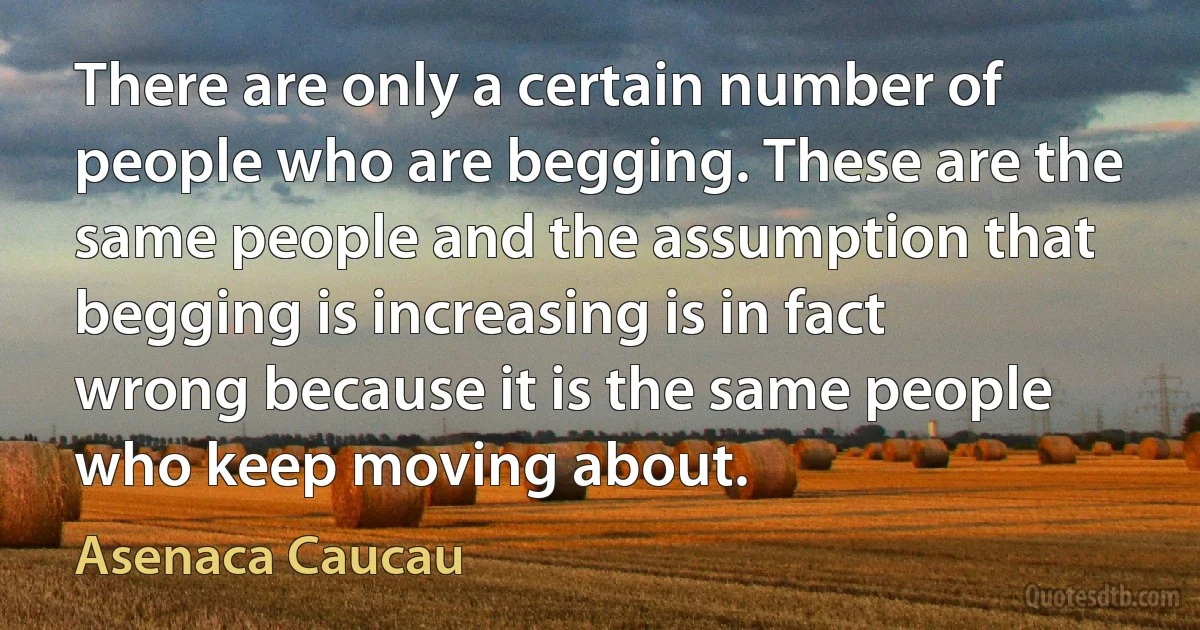Begging Quotes - page 5
Nobody ever wrote so well so fast as Jim. One year he wrote, and we published, nine novels. It was an obsession. Back in 1941, his father had been in an asylum in Oklahoma City, begging Jim to get him out. Jim needed money to get him out, so he said to his father, "Give me a month, and I'll raise the money." His father brightened, because Jim never went back on his word. Jim took a bus to New York City and went door to door to the publishing houses, asking for money for a hotel room, a rented typewriter and meals so he could write a novel. Finally, at Modern Age, they took a chance, and in 10 days he wrote a novel. But things being what they are in publishing, it was a month plus one day before Jim got his advance. The same day, a telegram arrived. His father had committed suicide, ripping the excelsior out of his mattress and stuffing it down his throat. When Jim would drink he would sometimes cry and say, "Why couldn't he have waited another day? Didn't he trust me?"

Arnold Hano
I don't absolve my father completely of his responsibility for what he did to us... I feel compassion, maybe. He had his demons. But I still can't understand how a man can walk away from children. And leave them to starve, as we nearly did, if it wasn't for my mother going out and begging.

Frank McCourt
Hoyt began moving his lips as if he were trying to suck the ice cream off the top of a cone without using his teeth. She tried to make her lips move in sync with his. The next thing she knew, Hoyt had put his hand sort of under her thigh and hoisted her leg up over his thigh. What was she to do? Was this the point she should say, "Stop!”? No, she shouldn't put it that way. It would be much cooler to say, "No, Hoyt,” in an even voice, the way you would talk to a dog that insists on begging at the table.
Slither slither slither slither went the tongue, but the hand that was what she tried to concentrate on, the hand, since it has the entire terrain of her torso to explore and not just the otorhinolaryngological caverns – oh God, it was not just at the border where the flesh of the breast joins the pectoral sheath of the chest – no, the hand was cupping her entire right – Now! She must say "No, Hoyt” and talk to him like a dog[...].

Tom Wolfe
The brain is full of lonely ideas, begging you to make some sense of them, to recognize them as interesting. The lazy brain just files them away in old pigeonholes, like a bureaucrat who wants an easy life. The lively brain picks and chooses and creates new works of art out of ideas.

Theodore Zeldin
Anarchists know that a long period of education must precede any great fundamental change in society, hence they do not believe in vote begging, nor political campaigns, but rather in the development of self-thinking individuals. We look away from government for relief, because we know that force (legalized) invades the personal liberty of man, seizes upon the natural elements and intervenes between man and natural laws; from this exercise of force through governments flows nearly all the misery, poverty, crime and confusion existing in society.

Lucy Parsons
I think you're begging the question,' said Haydock, 'and I can see looming ahead one of those terrible exercises in probability where six men have white hats and six men have black hats and you have to work it out by mathematics how likely it is that the hats will get mixed up and in what proportion. If you start thinking about things like that, you would go round the bend. Let me assure you of that.

Agatha Christie
Most of the original group [of elephants] succumbed to the climate, and he [Hannibal] was always begging Carthage for more, but the people at home were stingy. They would ask if he thought they were made of elephants and what he had done with the elephants they sent before. Sometimes, when he hadn't an elephant to his name, he would manage to wangle a few from somewhere, a feat which strikes me as his greatest claim to our attention.

Will Cuppy
What is important, and I think celebrities should do, is show your children when they are young is that wealth is not important. I took my children when they where young to Brazil, to the shanty towns with children begging. Ever since that day, I have had no problems with my children, if I buy them anything they are grateful.

Uri Geller
But still the great public opinion of the free States was unmoved. It cried angrily, 'You're only making matters worse. It's very hard, but what can we do? It's none of our business. It's none of our business'. But when 1850 came, and theory was found to be fact, when the man who was angrily crying, 'It's none of my business, what have I to do with slavery?' suddenly felt the quivering, panting fugitive clinging to his knees - a wretched, forlorn, outcast, hunted man, guilty of no crime but color, and begging the succor that no honest man would refuse to a cur cowering on his threshold - then, as he stood aghast and heard Slavery thundering at his door, 'I am the law. Give me my prey! Give me my prey!

George William Curtis
This is a vicious circle. This is the fishmarket. This is working for survival. This is survival of the fastest. This is the Darwinist capital of the capitalist world. A head afraid is a head haunted. A head haunted is a head hunted. Run for your life. Run from the guillotine to a head hunter who saves your head and raises your salary-so you'll be caught in the red of the fishmarket buying gadgets to distract your fragile imagination that is cut in the red market of blood-running and escaping-running again-changing your resume to update the fear you feel of being unemployed tomorrow-in the streets-and from there to welfare-and from there to begging.

Giannina Braschi
More importantly however, is that a new generation of leaders is emerging in Africa who does not want to approach the world with a begging bowl. Leaders who want to engage the world as partners; leaders who are prepared to take responsibilities for the problems of their countries and continent; leaders who recognize the enormous opportunities that abound in the world and are eager to connect Africa to the centres of those opportunities; leaders who want to harness the huge resources of Africa to play on the global stage; leaders who are not content to ask, ‘what can the rest of the world do for us', but rather ‘what can we do with the rest of the world.

Bukola Saraki
I could point to that liquid and say to you, I have taken my drop of water from the immensity of creation, and I have taken it full of the elements appropriated to the development of inferior beings. And I wait, I watch, I question it, begging it to recommence for me the beautiful spectacle of the first creation. But it is dumb, dumb since these experiments were begun several years ago; it is dumb because I have kept it from the only thing man cannot produce, from the germs which float in the air, from Life, for Life is a germ and a germ is Life. Never will the doctrine of spontaneous generation recover from the mortal blow of this simple experiment.

Louis Pasteur



